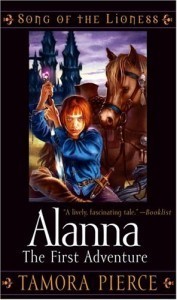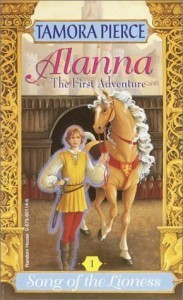Revisiting Tortall: Alanna The First Adventure
Tamora Pierce was a touchstone author for me in my teens, and helped to define what I wanted out of fantasy fiction. For a long time, she was on my annual re-read list, before I stopped, well, re-reading for nearly a decade. How do her Tortall books stand up to my 2013 self?
 1. Alanna, The First Adventure, The Song of the Lioness Book 1, by Tamora Pierce
1. Alanna, The First Adventure, The Song of the Lioness Book 1, by Tamora Pierce
Ten-year-old Alanna wants to be a knight, and her twin brother wants to be a magician. She convinces him to swap places with her, so that he gets sent to the nunnery (and convenient nearby magic school) while she disguises her gender for four years to live her dream. Along the way she befriends both the prince royal and the king of thieves, learns to bind her breasts and hide her periods, builds up some kickass brawling skills to go with the sword work, and saves the kingdom a couple of times.
Tortall as a setting looks on the surface to be Standard Medievaland, but I know from future reading that there’s a lot more to it than that. In particular, while this particular time and place has some fairly traditional ‘ladies do embroidery) gender roles and expectations, it becomes more obvious later on that the kingdom has a long history of women picking up swords.
Like Harry Potter, these books age with the character, and the first one has always felt a bit kiddish to me – probably because I started reading the series originally with book 2, and it was hard to go backwards. Part of me still approaches Book 1 as being ‘filling in the backstory to where the series really starts’ but I’m not sure it’s just my original reading order that gives this impression – the book actually does skim a LOT.
 There’s a bunch of action (and several years) packed into a pretty slender volume, and while the set piece scenes are all very good, it feels like a lot of nuance is missed along the way. There’s a lot of telling rather than showing about Alanna’s friendships. In particular, the boy who dies from the plague and Alex who joins the suspicious Duke Roger as his squire – Alanna’s friendships with both of these young men are really important to the plot and yet apart from a bunch of ‘Alanna doesn’t swim when the boys do’ scenes, there’s not a lot of opportunity for us to get to know them.
There’s a bunch of action (and several years) packed into a pretty slender volume, and while the set piece scenes are all very good, it feels like a lot of nuance is missed along the way. There’s a lot of telling rather than showing about Alanna’s friendships. In particular, the boy who dies from the plague and Alex who joins the suspicious Duke Roger as his squire – Alanna’s friendships with both of these young men are really important to the plot and yet apart from a bunch of ‘Alanna doesn’t swim when the boys do’ scenes, there’s not a lot of opportunity for us to get to know them.
Having said all that – this is the beginning of a journey I am exceedingly fond of, and I do love Alanna for all her scratchy, fast-paced ways. The scenes in which she learns how to fight hard are particularly compelling, and I like the idea that balancing fighting with healing is such an important theme in these books.
I also think it’s interesting that Alanna has serious self esteem issues, some of which are natural to her and some which come specifically from the gender performance she is going through. She has guilt about the fact that the friendships which are so important to her are based on a big lie, and continues to worry about this even after two of her closest friends discover her secret and still like her afterwards. She has to work hard to compensate for her small frame, and to build up muscle and other tricks to balance this out. She also comes from a family that has never particularly valued her, and so the support and love she gets from the people around her (as represented not only by aid and assistance but by actual tokens of esteem – the horse that George gives her, the sword that Sir Myles allows her to keep) is something she also has to learn how to absorb.
The finale is not just about her winning the day, saving the prince and dealing with his knowledge of her secret – it’s also about Alanna coming to terms with her own worth. Telling Prince Jonathan that he should choose her as the squire and why is a big step for her.
This is the book that sets everything up – a girl, her friends, her sword, her enemy, and her horse. But much better is yet to come!



